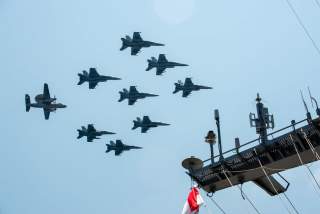China's Strategy in Asia Is Simple: Kick America Out
China wants the United States to know its place, go home and stay there.
Six Concerns Complicating Accommodation
Behavior: China is a republic but not a democracy, and its government’s behavior toward its own citizens and toward foreigners and neighboring states, including Australia, India, Indonesia, Japan, Malaysia, the Philippines and Vietnam, reminds Americans that bilateral relations cannot yet be normal and cooperation cannot yet be close.
Collision: The United States became a western Pacific power by expansion and blood purchase. It has much to regret but also to honor in that history; it has much to risk by seeing that history as unending. The most active American role in the western Pacific is played in the Taiwan Straits, which China claims historically, and the South China Sea, which it claims illegally. Confrontation is assured and must be thought through calmly in advance by all involved powers.
North Korea: China’s client and customer and cat’s paw, North Korea, remains determined to threaten Japan and the United States with nuclear and perhaps thermonuclear explosives delivered ballistically. This situation cannot end well unless China ends it soon, and upon its ending well rests the future of accommodation—and the lives and generational health of many millions of people in many countries.
Hegemonic nationalism: With restoration of confidence may come a chest-thumping nationalism pressing for restoration of China to the regionally hegemonic role it played in many, but not in all, dynasties. That role came to be played by Western powers—and briefly by Japan—and was then assumed and has been retained by the United States. China may be back, but the United States is not about to leave.
Authoritarianism: China’s domestic political heading is retrograde, and on this course today it is joined in parallel by several other major states. If China’s authoritarianism begins to diffuse into its traditional tribute area, into the central Asian states lining its “Belt and Road” trade-infrastructure initiative, into its neocolonized supplier states in and beyond Asia, or just across the Taiwan Straits, east-west relations may worsen irretrievably.
Inattention: The end of the Cold War was disorienting for leaders and advisors alike. Collective wisdom was not all-wise. The United States was suddenly the globe’s sole superpower. History had “ended.” Democracy was spreading ineluctably. Challenges would now come only “asymmetrically” from spoilers: terrorist networks and rogue states. These assumptions were wrong. Great-power politics would be back. In 2014 Russian troops departed their security postings at the Sochi Winter Olympics to reappear as “little green men” in Ukraine’s Crimea, and in 2016 China rejected an international court’s final ruling that its maritime encroachments violated United Nations conventions. In the Eastern European case, the United States and its closest allies could at least respond reflexively, in Cold War fashion, acting diplomatically and economically—but not materially. In the East Asian case, the United States registered its objection and continued to transit disputed areas but otherwise had to go on accepting a reality that had for years been evolving in plain sight. Both cases pointed to an unhappy truth: Western strategic thought, which should have been forethought, had instead become afterthought—and in the East Asian case not much of that. Strategists, long hibernating, must hereafter remain awake.
Robert H. Sprinkle is an associate professor at the University of Maryland’s School of Public Policy. Bradley A. Thayer is professor of international security in the School of Governance, Law and Society at Tallinn University in Estonia. He is currently a Visiting Fellow at the Magdalen College, University of Oxford.

